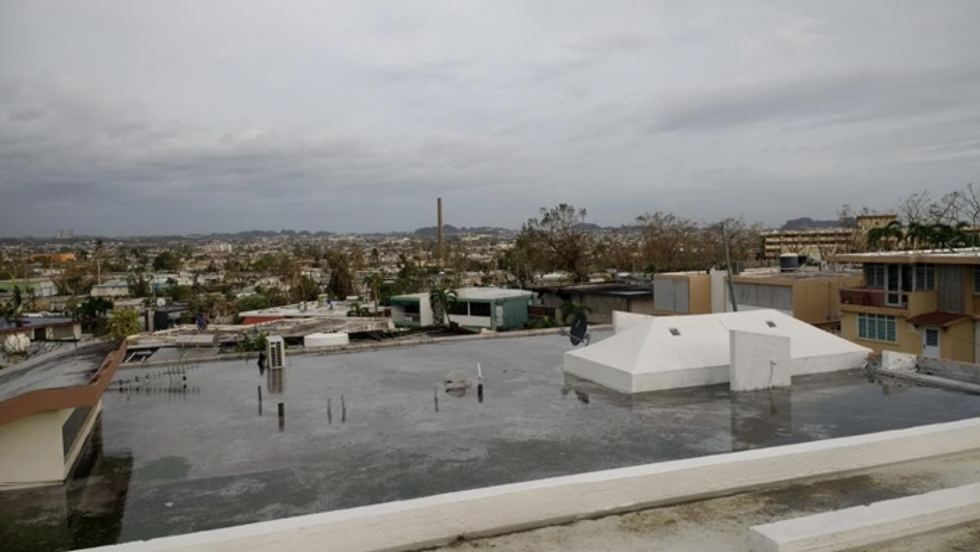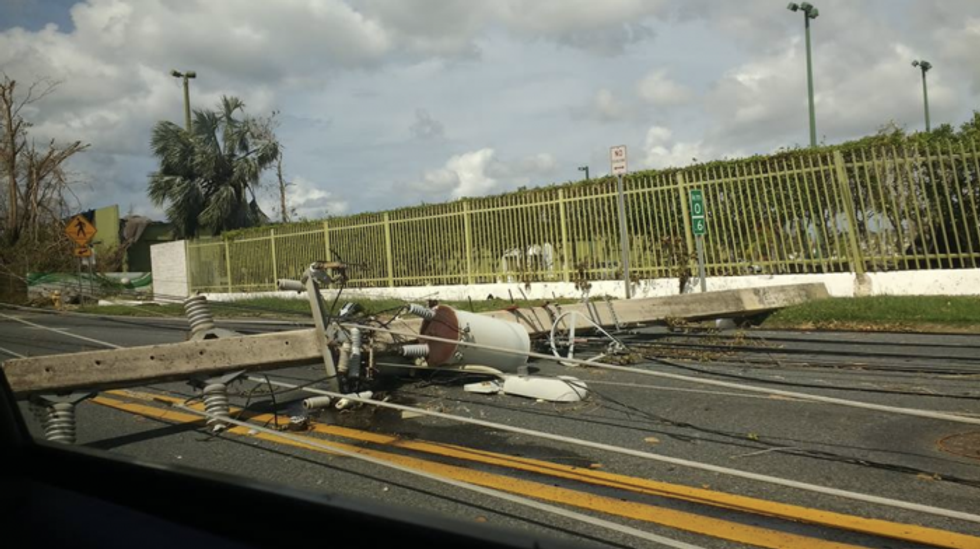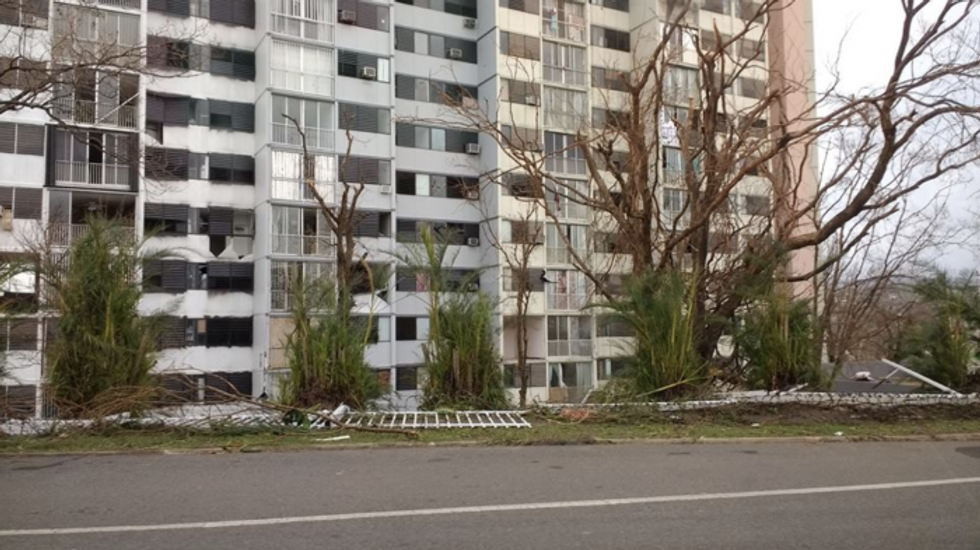

SUBSCRIBE TO OUR FREE NEWSLETTER
Daily news & progressive opinion—funded by the people, not the corporations—delivered straight to your inbox.
5
#000000
#FFFFFF
To donate by check, phone, or other method, see our More Ways to Give page.


Daily news & progressive opinion—funded by the people, not the corporations—delivered straight to your inbox.

Day before Hurricane Maria. Taken in Bayamon, Puerto Rico. ( Photo: Amira Odeh)
One year ago, I lived the scariest day of my life.
As the wind blew I could hear things falling and breaking outside. The walls of my (concrete-built) home were vibrating and water was coming in through every single window and door. At the moment I could only think of how to prepare for the worst and to be ready to seek refuge inside a closet or a bathroom.
It has been a year since the impact of Maria, and here in Puerto Rico, there are still families living in the dark, homes without a roof, people who haven't been able to find a new job after their businesses were destroyed, and people mourning their lost loved ones.
On September 20, 2017, I was fighting to keep my home and family safe during those long 24 hours that we endured Hurricane Maria. I would have never imagined what the next year would look like.
It has been a year since the impact of Maria, and here in Puerto Rico, there are still families living in the dark, homes without a roof, people who haven't been able to find a new job after their businesses were destroyed, and people mourning their lost loved ones.
Recovery has been extremely slow -- and on other parts of the island, there has been barely any recovery at all. With our communities all but abandoned by the federal government, enduring the past year has done lasting harm to the physical and mental health of thousands of Puerto Ricans.
Some of us are hopeful about this just being a phase that we will soon get through, but many others lose more and more hope daily.

What scares me the most is knowing that Hurricane Maria was just a glimpse of how climate change is affecting the Caribbean, and a warning of what's to come. Larger and stronger hurricanes will continue to cause deaths, destroy property and displace people, separating families and slowly destroying our culture.
Climate disasters are also an opportunity for disaster capitalism to continue enforcing the colonization dynamics that are already occurring in Puerto Rico. And as if there were not enough issues already, neither the government of Puerto Rico nor the U.S federal government are taking any action to mitigate climate change or prepare for future disasters. This is due in part to a lack of funding and to no initiative whatsoever, in addition to the climate denialism, from the US federal government to protect its colonies -- all of them vulnerable islands -- from climate change effects.
What scares me the most is knowing that Hurricane Maria was just a glimpse of how climate change is affecting the Caribbean, and a warning of what's to come.
For the more than 100 years that Puerto Rico has been a colony of the United States, the federal government has imposed unjust laws and systems of colonization that have helped create the island's current debt crisis. That debt crisis has been used to put in place policies that targeted worker and students' rights and put their well being in the hands of an unelected Financial Oversight and Management Board known as "La Junta."
With the local government under pressure to pay off its debts to the US, La Junta and the government continue to push brutal austerity measures -- slashing funding for our schools, cutting workers' benefits, and gutting dozens more public programs essential for our island's recovery -- instead of working for the people. And austerity has only gotten more punishing since the hurricane.

More areas from the public sector are up for sale, more laws are imposed that harm workers and benefit foreign investment, and more resources have been shifted to help the private sector instead of the people needing support most. All of these measures will continue to affect the quality of life of millions of Puerto Ricans if we find ourselves facing another hurricane in the coming years.
And as climate change makes hurricanes like Maria stronger and more frequent, I know that the next hurricane isn't a question of if, but of when.
There is still a lot to be done in Puerto Rico -- not only to recover from the hurricane, but also to free the country of the colonial systems that have long prevented people and our environment from thriving.

A year after Maria, we still need to do the long, hard work of building a power grid that relies on renewable energy, making sure people have safe homes, reopening businesses, making safe food and water accessible and making adaptation and mitigation of climate change one of our local priorities.
It is urgent that the US takes real action for Puerto Rico, do its part to fix the problems that it has caused, and treat with equality the millions of people who pay taxes and live in one of the colonies that the US invaded.
It is urgent that the US takes real action for Puerto Rico, do its part to fix the problems that it has caused, and treat with equality the millions of people who pay taxes and live in one of the colonies that the US invaded without consulting or being invited.
Puerto Rico deserves a prosperous future and safety, not leftovers from Congress and paper towels being thrown at us.
My family, our neighbors, and our people deserve more than this.
This article originally appeared on 350.org
Trump and Musk are on an unconstitutional rampage, aiming for virtually every corner of the federal government. These two right-wing billionaires are targeting nurses, scientists, teachers, daycare providers, judges, veterans, air traffic controllers, and nuclear safety inspectors. No one is safe. The food stamps program, Social Security, Medicare, and Medicaid are next. It’s an unprecedented disaster and a five-alarm fire, but there will be a reckoning. The people did not vote for this. The American people do not want this dystopian hellscape that hides behind claims of “efficiency.” Still, in reality, it is all a giveaway to corporate interests and the libertarian dreams of far-right oligarchs like Musk. Common Dreams is playing a vital role by reporting day and night on this orgy of corruption and greed, as well as what everyday people can do to organize and fight back. As a people-powered nonprofit news outlet, we cover issues the corporate media never will, but we can only continue with our readers’ support. |
One year ago, I lived the scariest day of my life.
As the wind blew I could hear things falling and breaking outside. The walls of my (concrete-built) home were vibrating and water was coming in through every single window and door. At the moment I could only think of how to prepare for the worst and to be ready to seek refuge inside a closet or a bathroom.
It has been a year since the impact of Maria, and here in Puerto Rico, there are still families living in the dark, homes without a roof, people who haven't been able to find a new job after their businesses were destroyed, and people mourning their lost loved ones.
On September 20, 2017, I was fighting to keep my home and family safe during those long 24 hours that we endured Hurricane Maria. I would have never imagined what the next year would look like.
It has been a year since the impact of Maria, and here in Puerto Rico, there are still families living in the dark, homes without a roof, people who haven't been able to find a new job after their businesses were destroyed, and people mourning their lost loved ones.
Recovery has been extremely slow -- and on other parts of the island, there has been barely any recovery at all. With our communities all but abandoned by the federal government, enduring the past year has done lasting harm to the physical and mental health of thousands of Puerto Ricans.
Some of us are hopeful about this just being a phase that we will soon get through, but many others lose more and more hope daily.

What scares me the most is knowing that Hurricane Maria was just a glimpse of how climate change is affecting the Caribbean, and a warning of what's to come. Larger and stronger hurricanes will continue to cause deaths, destroy property and displace people, separating families and slowly destroying our culture.
Climate disasters are also an opportunity for disaster capitalism to continue enforcing the colonization dynamics that are already occurring in Puerto Rico. And as if there were not enough issues already, neither the government of Puerto Rico nor the U.S federal government are taking any action to mitigate climate change or prepare for future disasters. This is due in part to a lack of funding and to no initiative whatsoever, in addition to the climate denialism, from the US federal government to protect its colonies -- all of them vulnerable islands -- from climate change effects.
What scares me the most is knowing that Hurricane Maria was just a glimpse of how climate change is affecting the Caribbean, and a warning of what's to come.
For the more than 100 years that Puerto Rico has been a colony of the United States, the federal government has imposed unjust laws and systems of colonization that have helped create the island's current debt crisis. That debt crisis has been used to put in place policies that targeted worker and students' rights and put their well being in the hands of an unelected Financial Oversight and Management Board known as "La Junta."
With the local government under pressure to pay off its debts to the US, La Junta and the government continue to push brutal austerity measures -- slashing funding for our schools, cutting workers' benefits, and gutting dozens more public programs essential for our island's recovery -- instead of working for the people. And austerity has only gotten more punishing since the hurricane.

More areas from the public sector are up for sale, more laws are imposed that harm workers and benefit foreign investment, and more resources have been shifted to help the private sector instead of the people needing support most. All of these measures will continue to affect the quality of life of millions of Puerto Ricans if we find ourselves facing another hurricane in the coming years.
And as climate change makes hurricanes like Maria stronger and more frequent, I know that the next hurricane isn't a question of if, but of when.
There is still a lot to be done in Puerto Rico -- not only to recover from the hurricane, but also to free the country of the colonial systems that have long prevented people and our environment from thriving.

A year after Maria, we still need to do the long, hard work of building a power grid that relies on renewable energy, making sure people have safe homes, reopening businesses, making safe food and water accessible and making adaptation and mitigation of climate change one of our local priorities.
It is urgent that the US takes real action for Puerto Rico, do its part to fix the problems that it has caused, and treat with equality the millions of people who pay taxes and live in one of the colonies that the US invaded.
It is urgent that the US takes real action for Puerto Rico, do its part to fix the problems that it has caused, and treat with equality the millions of people who pay taxes and live in one of the colonies that the US invaded without consulting or being invited.
Puerto Rico deserves a prosperous future and safety, not leftovers from Congress and paper towels being thrown at us.
My family, our neighbors, and our people deserve more than this.
This article originally appeared on 350.org
One year ago, I lived the scariest day of my life.
As the wind blew I could hear things falling and breaking outside. The walls of my (concrete-built) home were vibrating and water was coming in through every single window and door. At the moment I could only think of how to prepare for the worst and to be ready to seek refuge inside a closet or a bathroom.
It has been a year since the impact of Maria, and here in Puerto Rico, there are still families living in the dark, homes without a roof, people who haven't been able to find a new job after their businesses were destroyed, and people mourning their lost loved ones.
On September 20, 2017, I was fighting to keep my home and family safe during those long 24 hours that we endured Hurricane Maria. I would have never imagined what the next year would look like.
It has been a year since the impact of Maria, and here in Puerto Rico, there are still families living in the dark, homes without a roof, people who haven't been able to find a new job after their businesses were destroyed, and people mourning their lost loved ones.
Recovery has been extremely slow -- and on other parts of the island, there has been barely any recovery at all. With our communities all but abandoned by the federal government, enduring the past year has done lasting harm to the physical and mental health of thousands of Puerto Ricans.
Some of us are hopeful about this just being a phase that we will soon get through, but many others lose more and more hope daily.

What scares me the most is knowing that Hurricane Maria was just a glimpse of how climate change is affecting the Caribbean, and a warning of what's to come. Larger and stronger hurricanes will continue to cause deaths, destroy property and displace people, separating families and slowly destroying our culture.
Climate disasters are also an opportunity for disaster capitalism to continue enforcing the colonization dynamics that are already occurring in Puerto Rico. And as if there were not enough issues already, neither the government of Puerto Rico nor the U.S federal government are taking any action to mitigate climate change or prepare for future disasters. This is due in part to a lack of funding and to no initiative whatsoever, in addition to the climate denialism, from the US federal government to protect its colonies -- all of them vulnerable islands -- from climate change effects.
What scares me the most is knowing that Hurricane Maria was just a glimpse of how climate change is affecting the Caribbean, and a warning of what's to come.
For the more than 100 years that Puerto Rico has been a colony of the United States, the federal government has imposed unjust laws and systems of colonization that have helped create the island's current debt crisis. That debt crisis has been used to put in place policies that targeted worker and students' rights and put their well being in the hands of an unelected Financial Oversight and Management Board known as "La Junta."
With the local government under pressure to pay off its debts to the US, La Junta and the government continue to push brutal austerity measures -- slashing funding for our schools, cutting workers' benefits, and gutting dozens more public programs essential for our island's recovery -- instead of working for the people. And austerity has only gotten more punishing since the hurricane.

More areas from the public sector are up for sale, more laws are imposed that harm workers and benefit foreign investment, and more resources have been shifted to help the private sector instead of the people needing support most. All of these measures will continue to affect the quality of life of millions of Puerto Ricans if we find ourselves facing another hurricane in the coming years.
And as climate change makes hurricanes like Maria stronger and more frequent, I know that the next hurricane isn't a question of if, but of when.
There is still a lot to be done in Puerto Rico -- not only to recover from the hurricane, but also to free the country of the colonial systems that have long prevented people and our environment from thriving.

A year after Maria, we still need to do the long, hard work of building a power grid that relies on renewable energy, making sure people have safe homes, reopening businesses, making safe food and water accessible and making adaptation and mitigation of climate change one of our local priorities.
It is urgent that the US takes real action for Puerto Rico, do its part to fix the problems that it has caused, and treat with equality the millions of people who pay taxes and live in one of the colonies that the US invaded.
It is urgent that the US takes real action for Puerto Rico, do its part to fix the problems that it has caused, and treat with equality the millions of people who pay taxes and live in one of the colonies that the US invaded without consulting or being invited.
Puerto Rico deserves a prosperous future and safety, not leftovers from Congress and paper towels being thrown at us.
My family, our neighbors, and our people deserve more than this.
This article originally appeared on 350.org